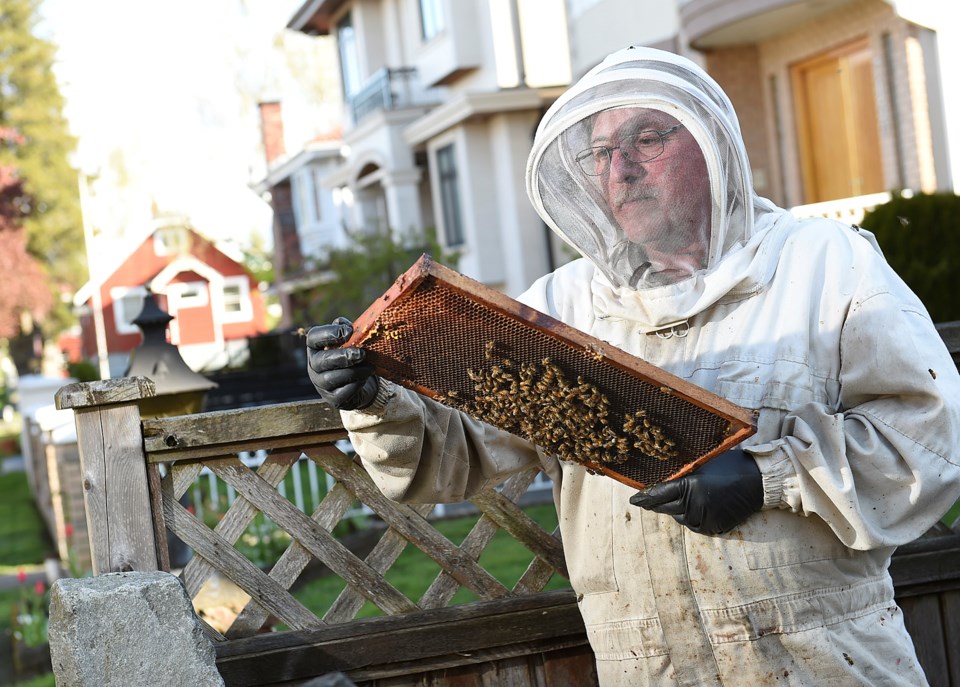Very soon, Vancouver will be abuzz with the sweet sound of honey in the making.
As the spring sun warms the air above 10 C, honeybees come out of their hives looking for nectar and pollen to bring back to the colony. It’s a natural process that’s imperative to a healthy environment, but over the last decade the bee population across North America has declined sharply.
Art Barker is a beekeeper with 3B Honeybee, a company trying to bring back the bees by installing hives across Metro Vancouver. In the five years since it started, 3B has grown from a mere 10 hives to more than 80, and Barker said they hope to top 120 by the end of the season.
Until recently, Barker said, many beekeepers were losing up to 90 per cent of their hives every year. Although things have improved somewhat, he said he still lost almost one-third of his bees last winter. He explained part of the problem is the ease with which pests and diseases can be transmitted internationally.
“One of the issues with bees is that we’ve made the world so small,” said Barker. “We put bees on planes [and] we ship them all over the world, we put them on trucks and we drive them all over the nation, and so basically in the last 40 years we’ve brought to North America almost every possible pathogen or insect that will affect the honeybees.”
Mark L. Winston, author of the 2015 Governor-General’s Literary Award for Nonfiction winner Bee Time: Lessons From the Hive and professor and senior fellow at Simon Fraser University’s Centre for Dialogue, called it a perfect storm of issues for bees, including accidentally imported pests and diseases, the overuse of pesticides and lack of pollen and nectar-producing plants.
“[Lack of forage] is a particularly acute problem in agricultural areas where you have vast monocrop acreages… which are virtually a desert for bees because when they’re not in bloom there’s nothing there,” said Winston.
Ironically, he said, cities are proving to be some of the heathiest habitats for bees because of the low pesticide use and incredible diversity of flowers and plant life in gardens and parks and along roads and right-of-ways, and it’s a relationship that is mutually beneficial.
“Many of the natural habitats that we have in the city and that we really enjoy depend on the bees pollinating flowers,” said Winston. “Without bees, the current up-swelling of urban agriculture wouldn’t exist because the bees are needed to pollinate a lot of the crops people plant in the city.”
Metro Vancouver residents eager to boost the yield of their gardens can sign up for 3B Honeybee’s “Sponsor a Hive’ program. Starting this month, Barker and his 3B cohorts will begin placing bee boxes in backyards and on rooftops all over the Lower Mainland.
The program costs $350 for the Early Spring Pollination package (early April to end of August) or $240 for the Honey Season package (early June to end of August). With both options, 3B will place one to two hives on a participant’s property, come around every two weeks to check on the bees and at the end of August collect the hives and deliver four jars of the honey they produced.
If residents wish, they can also don the provided protective gear, participate in the bi-weekly hive maintenance and receive what Barker calls “one-on-one beekeeping 101.” Despite the precautions during his lessons, he stressed prospective hive hosts needn’t worry about getting stung by their new neighbours while soaking up the summer sun.
“Mostly people are concerned because they don’t understand honeybees,” said Barker. “A honeybee is only interested in nectar and pollen. That’s what it consumes, that’s what it looks for. So it’s got no interest in your barbecue.”
Anyone interested in sponsoring a hive should check out bringingbackbees.ca or contact Art Barker at art3bhoneybee@gmail.com.
jameswes1981@gmail.com
@jameswesmith



